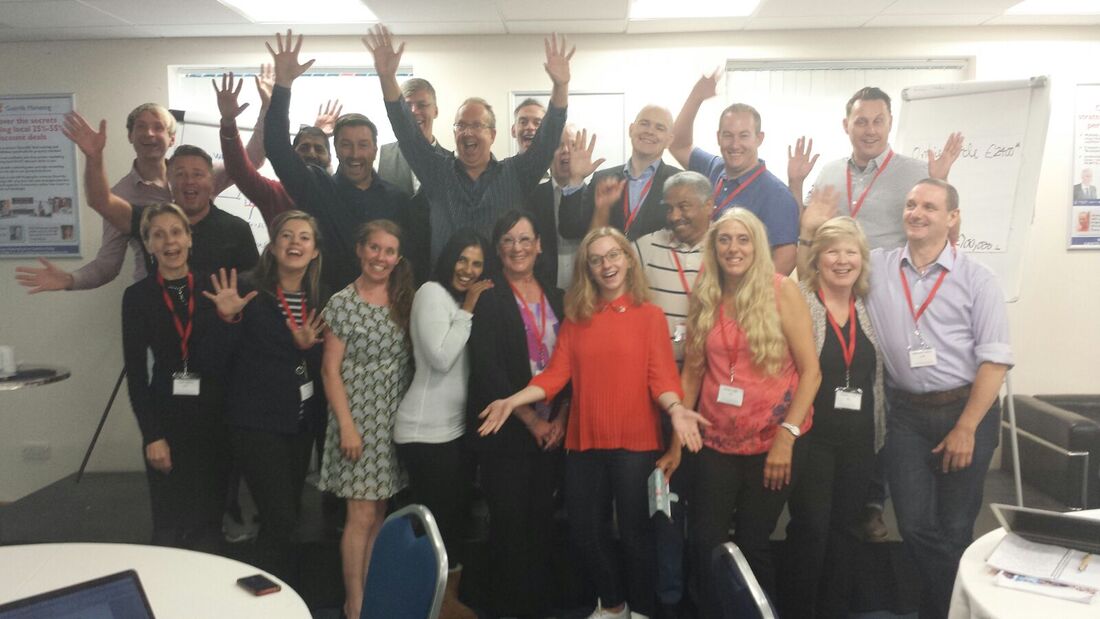|
The Thursday Thesis – 30/5/2019
Warning: Do not listen to the audio version of this blog if you are driving or operating machinery, as it contains hypnotic language patterns and may induce rapid Trance. Mention to anyone that you’re a hypnotist and you’ll often get funny looks from them. To many people there’s the image of the stage hypnotist and people quacking like ducks as they waddle around him; to others there’s the Svengali-like figure exerting mind control over his victim. But hypnosis – or Trance - is a natural state which we all pass into and emerge from throughout every day of our lives, and Hypnosis has been recorded in human history since the dynastic period in Egypt, around four thousand years ago. So – if everyone does it every day - why do people have strange ideas about trance and struggle to define what hypnosis is all about? Here’s my favourite definition of Trance: the condition of focused attention and the establishment of acceptable selective thinking. One thing that training in hypnosis has taught me is that people are in trance for almost all of the day: their family trance, their work trance, their geezer-down-the-pub trance – behaving differently from one context to another. Any parent who has lost their child for what seems like days on end as the child is absorbed in the latest computer game will have observed this, just as we have all seen people staring intently at their phones, impervious to the world around them. Computer games are designed to create absorption in order to keep the user in the game and create dependence by a carefully constructed pathway strewn with rewards and schemes: they are designed to induce trance in the players and to offer them a more engaging experience than dealing with reality. They’re not zombies, they’re just in trance and are not paying attention to what we call reality – just like I did as a child transforming myself into Spiderman, a Commando, the Wolves’ captain or my flavour-of-the-week favourite pop star. Being aware of trance phenomena has been a huge help when I’m working with my guitar students – particularly the ones who tell me “...I have no musical talent / I can’t play guitar... / I have no sense of rhythm...”which is just about everybody! The problem isn’t that they lack talent or haven’t been blessed with a “Gift”: the problem is that they’re stuck in a trance and don’t know how to get out of it. Over a lifetime they’ve accumulated evidence which supports the “no talent” statement or any other belief they hold about themselves: they have learned to focus their attention on what they cannot yet do and to only think in terms of how hard it would be for them to learn. It’s a circular belief system – a positive feedback loop – which demands that the student pays close attention to what they don’t know how to do (because they haven’t tried it yet), reminding them that they can’t play guitar and reinforces the belief that learning to play will be super-hard...especially for someone like them, who has no talent or natural gift.... They have a robust system of self-reinforcing beliefs and focused attention: that’s a Trance. Here’s the rule: if you’re not aware of it, you can’t affect it. That means we’ll rarely experience a change in ourselves unless we pay attention to how we move through the world; how we think, how we interact with others, how we talk to ourselves and how we view our experiences every day. How may we know to wake if we were not aware we are asleep? The other really cool thing I learned from hypnosis is what hypnotists call “Utilisation” – the process of using everything that happens as being a natural part of the client’s journey into Trance. For example, let’s suppose that - as the client relaxes ever more deeply and becomes more inwardly focused – a car alarm goes off in the street outside. The imperturbable hypnotist will utilise the unwanted noise to reinforce the client’s focus, as though the blaring horn was just another component of the mechanism of Trance, by saying “...and as you notice the sound of a car alarm in the street outside, you’ll simply pay closer and closer attention, now, to the sound of my voice as the car alarm grows quieter and more distant with every breath you take and every beat of your heart... and you notice once again that the sound of my voice takes you deeper and deeper down into the feelings you have that are the most relaxed feelings you’ve ever had, in the way that is most right for you...” This is a very powerful technique for the hypnotist to use, but suppose we just stole that idea and applied it across the everyday business of living? What new meaning could we make from the flat tyre or the laddered stocking, the deal that fell through or the date who stood us up? “...And as I leave the cinema and I attend to my breathing, I can thank my lucky stars that I can quickly eliminate her from my enquiries, which means that I retain a space in my life for someone who will show up for dates and who will be a better partner for me...this is a good thing”. Suppose we figured out how to make everything that happened to us a necessary precursor to our success or achievement of our worthy goal? Wouldn’t that be a Trance worth going into? © Neil Cowmeadow 2019 Please Like and Share The Thursday Thesis with your friends, family, and your invisible friend. I’d love to hear your comments, along with any ideas you’d care to hurl at me. [email protected]
0 Comments
Episode 152 - Making Movies
The Thursday Thesis – 23/5/2019 Remember the last time you went to the cinema? If the film maker did their job properly you were probably unaware of the exact moment when the real world fell away and you began to completely inhabit the world of the film. That’s because a good movie is an excellent induction into trance – the removal of critical faculty and the establishment of selective thinking. In a film-induced trance we can change rapidly, taking on the attributes of characters on screen. Ever watch an action movie and find yourself just a little more “alpha” then normal, swaggering just a tiny-bit more than usual? Or that rom-com you got dragged into by your better half: how did you think, feel and act when that movie ended? All day, every day, we have our very own mental movies running in the multiplexes of our minds. And what picture palaces our minds are! These are no common-or-garden movie theatres – our minds are 24/7 total immersion experience providers. Our sound systems are beyond Dolby THX, Surround Sound 5.1, exceeding even the best sound systems on the planet; visuals are projected all around us, 360 degrees in all directions, beyond 3D, HD, Imax, and 4K. Yet it is common for people to show only B-movies in their mental multiplex, replaying the memories of something they wish they could forget, or playing the future film of what they don’t want to happen, over and over again. Pain and Worry, now showing at a cinema near you. Repeatedly looping that tired old memory until you can remember every word, every nuance of movement, isn’t going to help you very much. Likewise, re-running the dystopian future fiction of worry is a powerful strategy for rehearsing disaster as we learn how to move, what to say and how to feel when everything goes terribly wrong. Now suppose you recognise that it’s your mental multiplex: you not only decide what movies play there, but you also create those movies – how would that be? Think about it – from the germ of an idea to the final cut, everything is under your control. Ask yourself what would you like your movie to be about? Now take a little time – just a few minutes – every day to create that movie. Be the writer and director, the musical director, the wardrobe person. If you have your goals written down, these can become the plot-points in the screenplay: a friend of mine actually storyboards her mental movies using 5”x3” index cards on a giant pinboard: she’s very successful and happy, giving most of the credit to her storyboard. “I just step into character and the movie starts...” she says “...all I do is act out what we’ve rehearsed.” “We?” I asked. It turns out that she lets Meryl Streep stand-in for her during rehearsals, and when Meryl’s got it nailed my friend takes over. So you should let an actor you admire take your place as the main character for the moment, because you don’t want just anybody messing-up the rehearsals do you? Hire the best actor you can think of to act your part: notice how they move, how they speak, and how much better than you they are when they’re in character. Of course, they’re a real pro and they never fluff their lines, fall over, stammer or corpse. Best of all, they’ll sometimes improvise something unexpected that’s even better than what you wrote. Keep seeing exactly what you want to be on screen from the director’s point of view, refining and editing, tweaking and improving it as you watch the playback at each test screening. Notice how the central character does things a little better with each take of the movie? When their performance is perfect, just drift into them and look out into the movie through their eyes as you pull on their hands just like a pair of gloves, fill-up their feet like you were putting on a pair of socks...feel how they feel as the movie unfolds and they perform brilliantly, in exactly the right way you want them to as they successfully take care of business, letting the boundary between them and you dissolve as you take on each of the attributes, characteristics and behaviours you need to allow the movie to continue, always free to make adjustments and improvements along the way, always sure of a happy ending. Best of all, there’s a sequel to your mental movie: it’s the story of what happened after the end of the first movie... Over time, it becomes an extended franchise and a blueprint for your life. Mental rehearsal is a proven strategy for sportsmen and women, and this is how elite athletes, politicians, performers and businesspeople practice when they are not “doing it” for real: they see themselves performing at the highest levels, flawlessly, over and over again; never falling or stumbling, just smooth, perfect performance of their script, movement, event, presentation or pitch. You own a great multiplex – a 24/7 Big Screen, Dolby Surround Sound, Multidimensional Dream Theatre... Why waste a venue like that by showing rubbish films? © Neil Cowmeadow 2019 Please Like and Share The Thursday Thesis with your friends, family, and your invisible friend. I’d love to hear your comments, along with any ideas you’d care to hurl at me. [email protected] Episode 151 - The Right Room
The Thursday Thesis – 16/5/2019 One of my mentors once told me "...always aim to be the dumbest and poorest person in the room." Roger that! A few days later, at a property investment conference some dear friends had taken me to, I was doing exactly what my mentor had told me to. Looking around the room I could see at a few dozen millionaire entrepreneurs and property investors, five best-selling authors, and scores of people already on the road to financial independence and their own personal version of success. And there's me, dragging around a ton of negative baggage from a difficult childhood in the rough end of town: I knew - and I suspected everyone else in that room knew - that I was by far the dumbest and poorest person in the room. So, I was certain that this was the right room for me. I stayed put, listened hard and took good notes... And last week I knew, beyond the faintest shadow of doubt, I was in the wrong room. Within a few minutes I began to suspect I was in the wrong room and after ten minutes I was getting itchy to leave. Finally, after listening to the presenters waffle on for 45 minutes they began to fumble embarrassingly with their equipment. I picked up my notebook and walked out. Why do we stay too long in the wrong rooms? Part of us wants things to get better; we want to be polite and not “rudely” vote with our feet, and it is human nature to want things to stay the same. Everybody moves into and out of a variety of “rooms” every day – work, meetings, shops, bars, restaurants, sports halls, and so on. Because humans are social chameleons, we subtly begin to adopt the mannerisms, language and behaviours of the other people in the room: we become like the people we associate with, don’t we? Doesn’t it make sense to hang around with people who are better than us in the aspects of our lives we’d like to improve? If you want to become expert at something (I will naturally suggest that this might be playing the guitar) get in a room with an expert teacher who can break the learning process down for you and reduce the amount of time it will take you to get where you want to go. Simple. Suppose you wanted to write a book - how cool would it be to spend time around successful authors, talking about the craft of writing? Imagine them describing their processes for generating characters, bolting plot elements together, making characters speak with an individual voice, and discovering your authorial voice... And that’s my point: we all drift in and out of different “rooms” throughout our day – usually without giving it a single thought – osmotically absorbing the norms and behaviours of the other people in each room. So how useful might it be to weigh-up if we are in the right room as we move through our days? © Neil Cowmeadow 2019 Please Like and Share The Thursday Thesis with your friends, family, and your invisible friend. I’d love to hear your comments, along with any ideas you’d care to hurl at me. [email protected] Episode 150 - How To Win...
The Thursday Thesis – 9/5/2019 The Formula One expert told me “...Winning is an either/or sort of thing – one is either the winner, or one is not. The difference between being first and second is infinitely more than one place in the finishers’ list: it’s all the difference in the World...” "..and if we can make 1/100th of a second every lap, and then get another 1/100th faster in the next race, we'll win a lot of races - period" He made it sound so easy - and I believed him. As a senior aerodynamicist at Lotus' racing division, he knew a thing or two about going fast in motor racing. He also knew a lot about going fast on bicycles - one of my life's passions - having worked with Chris Boardman on the Lotus bike that helped Chris win Olympic gold and break World Records. He said that - at its core - racing is a simple matter: you just have to go faster than the other bloke. Simple. If everything else is equal, you only have to go faster for a few seconds, or a few meters to make the difference between being the Winner and being the fastest loser. He described a slight advantage or improvement in performance as a “marginal gain”, and that once a tiny advantage has been gained, you only have to go as fast as the other fella. That’s all the winner’s advantage is – a split second of going faster, then maintaining that advantage until the finish line. And the important part of that is “finish line”, because it means never giving up, never slacking-off until the job is done, because your competition is snapping away at your metaphorical heels – waiting for you to make a mistake or suffer a mechanical problem, or just to get tired and ease off a smidge. So the very best thing to do is to go faster more than once, to figure out how to go faster twice, three times, four... When you add up all the little moments when you went a teeny bit faster than the other bloke it’s not a small difference any more – it’s the total of all the small things put together. Technically these are known as Aggregated Marginal Gains (AMGs) and the cumulative effect of stacking one AMG on top of another, on top of another – over and over again – can make a massive difference. And here’s the thing – whilst it’s daunting to aim for a big improvement in what you and I do every day – we can achieve massive improvements by making multiple Marginal Gains over time. If we do just one thing 1% better it’s probably no big deal. Let’s suppose we were horribly out of shape and could manage to run 100 metres... Well, our 1% improvement would add just 1metre to our run, and we’d push ourselves to cover 101 metres instead of 100. That’s doable, isn’t it? Next day we’d add 1% to our 101 metre run – edging the distance out to 102.01 metres. That’s all it takes, just 1% longer every day. Now suppose you could run just 1% faster every day: the 1% faster pace would be acting over 1% longer distance, compounding the improvements. How cool is that? Aggregating Marginal Gains is a great way to gradually improve whatever it is that you do, whether it’s sport, business, relationships or making music; and while a giant leap may be too scary to try for, but being 1% better – over and over again – that’s doable, isn’t it? © Neil Cowmeadow 2019 Please Like and Share The Thursday Thesis with your friends, family, and your invisible friend. I’d love to hear your comments, along with any ideas you’d care to hurl at me. [email protected] The Thursday Thesis – 2/5/2019
Humans are funny little creatures. This is not news, by the way – it’s a stone-cold fact. Give a human one thing and he’ll immediately want the opposite, give her what she said wanted and it will immediately change. Bit of a bugger isn’t it? And here’s the thing: everything is a continuum with us. Somewhere between extreme X and extreme Y we’ll settle...but not for long. The overwhelming impression is restlessness and a need for change, accompanied by an infuriating need for sameness and familiarity. When we experience too much sameness we say that we are bored, that everything is routine and life is dull. Give us too much change and we feel out of control and insecure, that we are stressed and scared. The minute we have too much of one or the other we react by trying to create more of what we were trying to get away from! Infuriating, but oh-so-human. And this change-versus-boredom pattern shows up in music, too. We like music to be sufficiently similar to everything else we’ve ever heard that it’s familiar and relatable; whilst at the same time needing it to be different enough to be interesting. You hear this all the time, when people say “Ooh, that reminds me of that old song by so-and-so...” or “All their songs sound the same...” There’s a reason for the similarity between songs: if a band or “artist” (pretentious terminology alert) suddenly switch genres or styles, their audience has a WTF moment and there’s uproar. Such reinvention is a risky strategy for a performer or a brand – having built an audience by being one thing, there’s a real danger of alienating that audience by suddenly becoming something else. Fans want their favourite acts to produce more of the same, but new versions of it. Every band or performer has their little quirk, their stylistic wrinkle on things; this is what their audience unconsciously identifies and resonates with. And every song has this continuum, too: verses establish the basic idea, but after a couple of verses we begin to want something new... that’s where the chorus comes in, to disrupt the pattern and change things...but now we begin to want more of the original verse idea, don’t we? Pretty soon, we’ll tire of the verse/chorus pattern, too – so that’s an opportunity for a guitar solo or a breakdown section, a “middle 8” that takes the music in a different direction. It’s fractal, as the same pattern emerges across all of life: sameness versus change. Do you recognise the pattern in your own life, just like I see it writ large in mine? Sameness keeps me comfortable, but too much of it and I’m bored rigid: massive change is scary and uncomfortable. Somewhere between the two extremes I find a tolerable compromise – and immediately begin to destabilise it. Infuriating, or what?! © Neil Cowmeadow 2019 Please Like and Share The Thursday Thesis with your friends, family, and your invisible friend. I’d love to hear your comments, along with any ideas you’d care to hurl at me. [email protected] |
Share it with your friends
It's Like This...The Thursday Thesis shares ideas which I think are worth spreading. Archives
May 2022
Categories
All
All content on these pages is the intellectual property of the author, unless otherwise stated, and may not be used in any form or reproduced under any circumstances without the authors permission.
|





 RSS Feed
RSS Feed